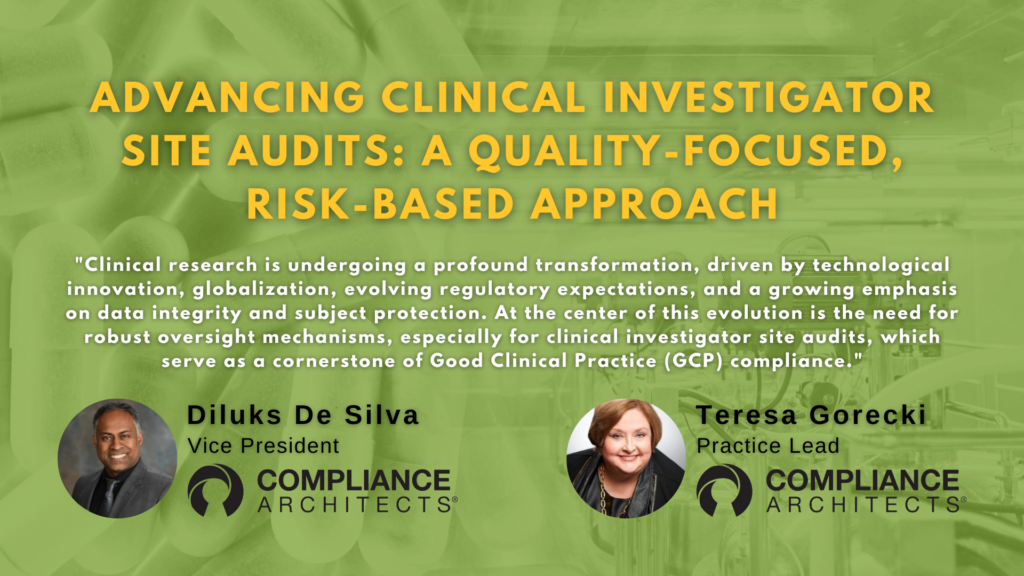The notion that the role of Integrated Quality Assurance Systems in clinical development should be relegated to reviews, audits, and quality control (QC) checks is an old-fashioned one. This could well run medical product developers afoul of FDA and international regulations.
The Role of Quality Assurance (QA) in Clinical Trials
The role of QA in clinical development has evolved significantly over the last two decades. Savvy companies will see that incorporating QA throughout the clinical study process can ensure that the trial’s execution meets regulatory requirements and aligns with the overall business strategy. This also reduces risk.
US regulations covering clinical trial conduct (21 CFR 50, 54, 56, and 312) do not specifically require a quality management system throughout all stages of trial design and execution. However, the QA unit usually carries out some of the product sponsor responsibilities outlined in Section 312—such as auditing.
Because of this, QA’s historical role in GCPs was often limited to auditing. However, the FDA and international regulators have developed expectations beyond the bare regulations that reflect ever-evolving best practices. Simple compliance with US regulations is no longer enough. FDA and harmonized international guidances must be considered, as well as current industry standards and best practices.
The Evolution of Quality Assurance and Good Clinical Practices
Over the years, the evolution and intersection of QA and Good Clinical Practices (GCP) expectations have provided medical product companies with both responsibilities. These responsibilities include compliance with regulations and meeting expectations outlined in FDA and international guidance. Additionally, they include the ability to define and re-define the roles and responsibilities of the quality unit supporting GCP compliance in ways to meet business goals.
A well-integrated GCP QA unit can add value to costly clinical trials by focusing on excellence in study execution. Better execution yields better data, which can help speed a new product application through the FDA approval process with fewer hiccups. This support can continue through the commercialization of new products. Specifically, the GCP QA can cover the following critical clinical trial roles and responsibilities:
Development, implementation, and maintenance of the GCP quality system.
This can include developing GCP quality metrics and implementing a quality management review process. The review process undergoes senior management in a sponsor company’s research and development division. The system should focus on identifying all potential risks to trial reliability and GCP compliance. Additionally, it should propose actions to mitigate that risk in line with existing business needs and strategies.
The quality metrics and related review plan will generate a risk-based GCP quality plan. This plan will include goals and objectives integrated into the overall business plan for the investigational new product.
Quality and compliance oversight of all GCP-related activities throughout the clinical trial design, preparation, and execution.
This role should include reviewing the clinical trial protocol, the risk management plan, and the oversight and monitoring plans. It should also include scrutinizing informed consent forms and other essential documents. These documents are those referenced in pertinent FDA regulations and guidances. An example would be the International Conference on Harmonization (ICH) Guideline for Good Clinical Practice (E6).
Document review is critical. The QA unit may act as a prevention-focused quality engineer in this role and must ensure that all documents meet pertinent regulatory requirements.
They must also ensure all documents are free from inconsistencies or problematic wording that could increase the risk of protocol deviations or violations. The unit should also look for opportunities to improve the informed consent form and the protocol. They should do this in ways that are likely to reduce user error during the informed consent process and trial execution.
Establishment of a third-party supplier quality management process.
CROs, laboratories, clinical investigators, and others involved in clinical trials must adhere to the sponsor’s QA/QC system. They also need to comply with current GCP and data integrity requirements. Specific activities conducted may include:
- Development and implementation of supplier quality metrics, through which the sponsor may monitor GCP compliance by all material and service suppliers;
- Periodic audits of third parties to ensure compliance;
- Periodic internal audits of clinical operations, regulatory affairs, clinical development, and medical safety units to ensure GCP and safety reporting compliance and
- It is partnering with in-house GMP auditors to periodically audit R&D laboratories and production operations that support the manufacture and testing of clinical trial materials.
Development and implementation of a risk management plan and process.
Risk management is the watchword for FDA inspectors. Sponsors need a solid plan to ensure that all potential risks associated with an investigational product and clinical trial are identified. Any risks deemed central or critical need to be mitigated and communicated to the sponsor company’s senior management.
Periodic management review of the GCP quality system should be part of the process. This helps ensure senior management is aware of the system’s nuts and bolts, allowing them to prioritize actions to address critical quality and compliance risks.
Other key QA activities may include:
- periodic GCP training for clinical operations
- regulatory affairs
- clinical development
- medical safety staff and review of monitoring reports from site visits to ensure that identified issues are addressed promptly and appropriately, along with the escalation of critical quality and compliance issues discovered during the conduct of a clinical trial
- preparing for and leading FDA Bioresearch Monitoring (BIMO) inspections
The QA unit should also periodically report certain GCP quality and compliance metrics to the clinical operations, clinical development, and regulatory affairs departments. These include:
- Performance metrics for the contract research organizations (CROs) and principal investigators;
- Protocol deviation trends;
- Corrective and Preventive Action (CAPA) effectiveness in reducing critical risks to trial reliability;
- Timeliness of safety reporting and
- Internal and external GCP audit findings.
Creating a GCP QA unit that covers these responsibilities will move sponsors to the head of the new product development pack. Companies must be well-versed in applicable regulations, guidelines, and current industry standards and best practices to complete a compelling and compliant QA unit and system.
In the meantime, if you are interested in Integrated Quality Assurance Systems guidance, please get in touch with us below.
FAQs on Integrated Quality Assurance Systems in Clinical Trials
Q1: What are Integrated Quality Assurance Systems in Clinical Trials?
A1: Integrated Quality Assurance Systems in Clinical Trials are comprehensive processes and tools that ensure data and results’ reliability, integrity, and quality throughout the clinical trial lifecycle.
Q2: Why are Integrated QA Systems Important in Clinical Trials?
A2: They are crucial because they help maintain data accuracy, patient safety, and regulatory compliance, ultimately increasing the chances of successful clinical trial outcomes.
Q3: What Role Does QA Play in Ensuring Clinical Trial Success?
A3: QA plays a pivotal role by identifying and mitigating risks, ensuring protocol adherence, and enhancing overall trial quality, leading to successful trial completion.
Q4: How Do Integrated QA Systems Improve Data Integrity?
A4: Integrated QA systems employ data validation, monitoring, and auditing techniques to identify and prevent errors, ensuring data accuracy and integrity.
Q5: Can Integrated QA Systems Help Expedite the Clinical Trial Process?
A5: Yes, they can. By streamlining processes, reducing errors, and ensuring compliance, integrated QA systems can potentially shorten the trial timeline.
Q6: Are Integrated QA Systems Cost-Effective?
A6: While implementing QA systems may require an initial investment, the long-term benefits, including reduced errors and regulatory issues, often outweigh the costs.
Q7: Do QA Systems Enhance Patient Safety in Clinical Trials?
A7: Absolutely. QA systems help identify and mitigate risks, ensuring patient safety is a top priority throughout the trial.
Q8: Do Regulatory Authorities require Integrated QA Systems?
A8: Regulatory authorities often require quality assurance measures to ensure the validity of clinical trial data, making integrated QA systems essential for compliance.
Q9: What Are Some Best Practices for Implementing Integrated QA Systems?
A9: Best practices include defining transparent QA processes, training staff, regularly auditing trial data, and staying updated with regulatory requirements.
Q10: Where Can I Learn More About Implementing Integrated QA Systems in Clinical Trials?
A10: You can find more information through industry publications, regulatory guidelines, and consulting with clinical trial quality assurance experts.





